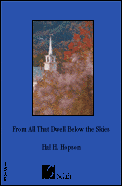|
|
 |
From All That Dwell Below the Skies
Composer Hal H. Hopson
Text Psalm 117; St. 1-2, Isaac Watts, 1719; st. 3-4, anonymous, ca. 1781
Voicing SAB, organ, opt. tpt., opt. bells, opt. cong.
Topics Praise and Adoration
Scripture Reference Psalm 117
Length 5' 40" Price $2.75 (U.S.) Released 5/00
Catalog no. 425-850 Difficulty Moderately easy
Discography Fill the World with Loudest Praise, St. Paul's Chamber Choir, Robert Brewer, conductor (Selah 520-425)
Order now!
Other editions 425-851--Conductor's score/Inst. parts Price $20 (U.S.)
Order Cond. Score and parts


Listen to this anthem in an MP3 recording
Read a history of the hymn
 Description Description
There are not many truly festive hymn settings for smaller choirs, but this is an outstanding one based on Psalm 117. Scored for SAB and organ, with optional parts for trumpet and four bells, this work based on LASST UNS ERFREUEN may be performed with or without congregation. In either case it yields a joyous and impressive musical result.
Text
From all that dwell below the skies,
let the Creator's praise arise. Alleluia! Alleluia!
Let the Redeemer's name be sung,
through every land by every tongue. Alleluia!
Eternal are thy mercies Lord;
eternal truth attends thy word. Alleluia! Alleluia!
Thy praise shall sound from shore to shore,
till suns shall rise and set no more. Alleluia!
Your lofty themes, ye mortals bring,
in songs of praise divinely sing, Alleluia! Alleluia!
The great salvation loud proclaim,
and shout for joy th Savior's name. Alleluia!
In every land begin the song;
to every land the strains belong, Alleluia! Alelluia!
In cheerful sounds all voices raise,
and fill the world with loudest praise. Alleluia!
--Psalm 117; st. 1-2, Issac Watts, 1719; st. 3-4, anonymous, ca. 1781.
History of the hymn
Isaac Watts (16741748), based this well-known hymn on Psalm 117. The Psalm is short, and so is the hymn, and many editors have included additional stanzas contributed by various authors.
This hymn first appeared in Watts' Psalms of David Imitated, in the Language of the New Testament (1719). Watts considered this, his last poetical collection, his greatest work. He devoted years of diligent effort to its completion and incorporated into it the evangelical vision already suggested in his earlier poems: "Christ and his cross is all our theme." Watts recognized how radical his work would appear to English Christians who, since the Reformation, had generally favored church use of nothing but Psalms. In Psalms of David, Watts set out to accommodate the Book of Psalms to Christian worship, making imaginative applications of David's expressions to Christian experience. His 1719 collection offered a wide variety of liturgical choice for specifically Christian worship. But while Watts "Christianized" many psalms, he left some without a New Testament gloss. Perhaps the best known among these are his renderings of Psalm 90-"Our God, our help in ages past"-and "From All That Dwell Below the Skies."
The first American publication of "From All That Dwell Below the Skies" was in Watts' The Psalms of David Imitated, in the language of the New Testament," published in Boston for Jonathan Edwards in 1741 (during the Great Awakening). By 1800, official collections of Presbyterian, Congregational Christian, Unitarian, Methodist, Universalist, Lutheran, and Church of the Brethren denominations had incorporated this hymn. In the 19th century, it was found as well in Mormon, Spiritualist and Christian Science collections.
The tune used in this arrangement is LASST UNS ERFREUEN. Taken from a German Catholic Reformation-era hymnal, Auserlesene Catholische, Geistliche Kirchengesange (1623), the tune was harmonized and introduced to English Protestants by Ralph Vaughan Williams in The English Hymnal, 1906. The "alleluias" added to Watts' text when it is used with this tune are the only refrain published with this text in American hymnals. The tune name derives from the first line of a German Easter hymn. Other names for this tune include EASTER ALLELUIA, ST. FRANCIS, and VIGILES ET SANCTI.
|




